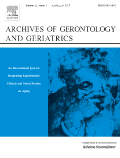
ARCHIVES OF GERONTOLOGY AND GERIATRICS
Scope & Guideline
Advancing knowledge in aging and geriatric care.
Introduction
Aims and Scopes
- Aging and Health Interventions:
Research on various interventions aimed at improving health outcomes in older adults, including pharmacological treatments, lifestyle modifications, and non-pharmacological approaches. - Frailty and Multimorbidity:
Exploration of frailty as a critical condition in older adults, examining its relationship with multimorbidity, disability, and overall health outcomes. - Cognitive Function and Dementia:
Studies focusing on cognitive decline, dementia prevention, and management strategies, including the role of physical and cognitive exercises. - Nutrition and Physical Activity:
Investigating the impact of nutrition and physical activity on aging, particularly the prevention of sarcopenia and maintenance of functional independence. - Social Determinants of Health:
Examining how social factors, such as isolation, support systems, and socioeconomic status, influence health outcomes in the elderly. - Technological Innovations in Geriatrics:
Research on the application of technology in geriatric care, including telehealth, digital health interventions, and assistive technologies.
Trending and Emerging
- Mental Health and Well-Being:
An increasing number of studies are focusing on the mental health aspects of aging, particularly the relationships between depression, anxiety, and cognitive decline. - Social Isolation and Loneliness:
Research addressing the impacts of social isolation and loneliness among older adults has gained prominence, especially in the context of the COVID-19 pandemic. - Sarcopenia and Muscle Health:
There is a growing emphasis on understanding sarcopenia, its risk factors, and its implications for overall health and mobility in older adults. - Digital Health Solutions:
Research into the use of digital health technologies, including telehealth and mobile health applications, is trending as a means to enhance care and improve health outcomes. - Intergenerational Relationships:
Emerging studies are exploring intergenerational relationships and their impact on the well-being of older adults, highlighting the importance of social connections across age groups.
Declining or Waning
- Traditional Pharmacological Approaches:
There has been a noticeable decline in studies focusing solely on traditional pharmacological treatments for geriatric conditions, with more emphasis shifting towards holistic and lifestyle interventions. - Ageism and Stereotypes of Aging:
Research specifically addressing ageism and the societal perceptions of aging has seen a reduction, possibly overshadowed by more pressing health-related issues. - Institutional Care Models:
The exploration of institutional care models has waned, as more focus is placed on community-based care and aging in place. - Acute Care Interventions:
Research on interventions in acute care settings for older adults has decreased, with a shift towards preventive and long-term care approaches.
Similar Journals

Turkish Journal of Geriatrics-Turk Geriatri Dergisi
Empowering the future of aging studies.The Turkish Journal of Geriatrics (Türk Geriatri Dergisi), with ISSN 1304-2947 and E-ISSN 1307-9948, is a distinguished scholarly publication dedicated to the field of geriatrics and gerontology, proudly published by the Turkish Geriatrics Society. Established to foster knowledge and research in the aging population, this journal plays a crucial role in disseminating significant findings and advancements in the medical care of elderly individuals. Since its inception in 1998, the journal has committed to high-quality, peer-reviewed articles that explore diverse aspects of geriatric medicine, contributing vital insights to practitioners and researchers alike. Although it currently holds a Q4 ranking in the category of Geriatrics and Gerontology, the Turkish Journal of Geriatrics is on an upward trajectory, making it an essential resource for those specializing in the care of older adults. Researchers and professionals are encouraged to explore its rich archive and benefit from the open-access publishing model, promoting broader access to impactful research. For those invested in the well-being of the elderly, the Turkish Journal of Geriatrics serves not only as a platform for scholarly communication but also as a catalyst for innovation in geriatric care.
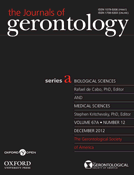
JOURNALS OF GERONTOLOGY SERIES A-BIOLOGICAL SCIENCES AND MEDICAL SCIENCES
Bridging Biology and Medicine in Gerontology ResearchJournals of Gerontology Series A: Biological Sciences and Medical Sciences, published by Oxford University Press Inc, stands at the forefront of aging research, bridging the gap between biological sciences and medical practices to address the complexities of gerontology. With an impressive impact factor reflecting its significant contribution to the field, this journal is recognized within the Q2 quartile in Aging and the Q1 quartile in Geriatrics and Gerontology for 2023, evidencing its high-quality scholarship and relevance. Researchers and professionals will find valuable insights through its comprehensive coverage of aging-related topics, informed by cutting-edge studies ranked among the top in their category—Rank #11 in Geriatrics and Gerontology and Rank #9 in Aging on Scopus. The journal aims to disseminate innovative research that can impact health care practices and enhance the quality of life in older populations. For those engaged in studies of aging, this journal offers a vital platform for sharing knowledge and advancing the understanding of biological and medical sciences as they pertain to gerontology.
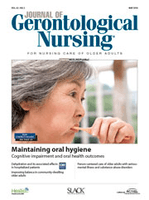
Journal of Gerontological Nursing
Championing Quality of Life for SeniorsThe Journal of Gerontological Nursing, published by SLACK INC, is a leading peer-reviewed journal dedicated to advancing the field of gerontological nursing through innovative research, clinical practice, and educational advancements. Since its inception in 1975, this journal has become a crucial resource for researchers, healthcare professionals, and students interested in the care and management of older adults. With an impact factor that reflects its significance within the disciplines of gerontology and nursing (Category Quartiles: Q3 in Gerontology and Q3 in Nursing), it serves as a platform for disseminating vital findings, best practices, and evidence-based approaches aimed at improving the quality of life for the aging population. While the journal maintains a print-only format, its content is invaluable for those looking to stay ahead in the rapidly evolving landscape of gerontological care. As it continues to publish until 2024, the Journal of Gerontological Nursing invites contributions that foster dialogue and innovation within this essential area of healthcare.

Aging Medicine and Healthcare
Transforming Geriatric Care Through Open Access ResearchAging Medicine and Healthcare is a leading Open Access journal dedicated to advancing the understanding of geriatric health and the complexities of aging. Published by the Asia Pacific League Clinical Gerontology & Geriatrics, this innovative journal began its journey in 2019 and has since established itself as an important resource for healthcare professionals, researchers, and students interested in the fields of geriatrics and gerontology. With an impact factor that reflects its growing significance (ranked in the 21st percentile within its category), the journal aims to disseminate high-quality research and practical insights that can inform clinical practice and enhance patient care for aging populations. As an Open Access publication, it ensures that research findings are freely accessible, fostering collaboration and knowledge sharing among academics and practitioners globally. The journal is poised to be a vital platform for innovative studies, systematic reviews, and case reports that illuminate the challenges and opportunities in aging medicine.

Current Geriatrics Reports
Shaping the future of geriatric care through innovative insights.Current Geriatrics Reports is a pivotal journal published by SPRINGER, dedicated to disseminating cutting-edge research and insights in the dynamic field of geriatrics and gerontology. Launched in 2014 and ongoing until 2024, this journal plays a critical role in addressing the complex needs and challenges faced by the aging population. Although it currently holds a Q4 quartile ranking in its category and occupies the 84th position out of 116 in the Scopus metrics for Medicine, Geriatrics, and Gerontology, it serves as a vital platform for emerging research that shapes clinical practices and policy-making. Researchers, professionals, and students alike will find Current Geriatrics Reports to be an invaluable resource for staying updated on advancements, best practices, and innovations in geriatric care. While the journal is not open access, it continues to impact the field significantly and enrich contemporary discussions surrounding aging.
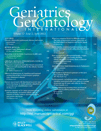
Geriatrics & Gerontology International
Pioneering Insights into Elderly CareGeriatrics & Gerontology International, published by WILEY, is a prestigious academic journal dedicated to advancing the field of geriatric and gerontological research. With a strong focus on the interdisciplinary aspects of aging, this journal has established itself as a leading source of high-quality research, reflected in its impressive impact factor and 2023 Scopus rankings, including a Q1 status in Health (Social Science) and Q2 in both Geriatrics and Gerontology. Since its inception in 2004 and continuous publication from 2008 to 2024, it has fostered a vibrant exchange of ideas among researchers, clinicians, and students alike. The journal serves as a critical resource for innovative studies, reviews, and commentaries that help shape policies and practices affecting the elderly population. It is essential reading for those dedicated to improving the quality of life for older adults and contributes significantly to the understanding of the complexities surrounding aging.
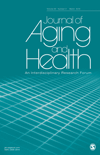
JOURNAL OF AGING AND HEALTH
Elevating discourse on aging and societal health.The JOURNAL OF AGING AND HEALTH, published by SAGE PUBLICATIONS INC, is a preeminent peer-reviewed journal dedicated to advancing research in the field of gerontology and related disciplines. With an impressive impact factor and ranked Q1 across multiple categories including Community and Home Care, Geriatrics and Gerontology, and Health (Social Science), this journal has established itself as a vital resource for academics, clinicians, and policymakers alike. Spanning over three decades of publication from 1989 to 2024, it serves as a platform for innovative research and multifaceted discussions on aging, health, and the interplay of social factors influencing the elderly population. The journal's rigorous standards for publication ensure high-quality contributions that are impactful and relevant, making it an essential read for those dedicated to improving the health and quality of life for older adults. Although it is not an open-access journal, it provides comprehensive insights that are critical to understanding the complexities of aging in today's society.

Journal of Gerontology and Geriatrics
Bridging Research and Practice in GeriatricsJournal of Gerontology and Geriatrics, published by PACINI EDITORE, is a crucial resource for those dedicated to the study of aging and geriatric health. Since its inception in 2016, this journal has aimed to disseminate high-quality research and findings that address the intricate biological, social, and psychological aspects of aging. With ISSN 2499-6564 and E-ISSN 2499-6564, it strives to foster discussions that enhance our understanding of gerontology and geriatrics on a global scale, despite its current positioning in the Q4 quartile of academic rankings. Located in Pisa, Italy, the journal invites contributions from researchers, professionals, and students who are passionate about advancing knowledge in these critical fields. Although it currently does not offer open access, the journal plays a vital role in connecting the community with essential insights that guide both research and practice in geriatric care.

European Journal of Geriatrics and Gerontology
Fostering collaboration in geriatric and gerontological studies.Welcome to the European Journal of Geriatrics and Gerontology, a peer-reviewed platform dedicated to advancing knowledge and research in the fields of geriatrics and gerontology. Published by GALENOS PUBL HOUSE, this journal serves as a critical resource for researchers, healthcare professionals, and students who are involved in the care, treatment, and study of elderly populations. Since its inception in 2019 and running through 2024, the journal aims to foster interdisciplinary collaboration and disseminate innovative research that addresses the unique challenges faced by older adults. With an ISSN of 2687-2625, the journal is classified in the Q4 quartile of the Geriatrics and Gerontology category, signifying its emerging influence within the academic community, despite its current Scopus ranking of #113 out of 116, reflecting a rich opportunity for growth and visibility. Although the journal is not open access, it maintains a commitment to scholarly rigor and quality. Engage with the European Journal of Geriatrics and Gerontology to contribute to and learn from the evolving discourse in aging research.

Journal of Frailty & Aging
Fostering innovation in the study of frailty.Journal of Frailty & Aging, published by SPRINGER BASEL AG, is a leading platform dedicated to advancing research in the fields of aging, geriatrics, and gerontology. With an ISSN of 2260-1341 and an E-ISSN of 2273-4309, this journal has established itself as a pivotal resource for scholars and practitioners aiming to explore the complexities of frailty and its impact on aging populations. As of 2023, it proudly holds a Q3 classification in Aging and Q2 classifications in both Geriatrics and Gerontology, as well as Physiology (medical), alongside a notable Q1 ranking in Medicine (miscellaneous). The journal's Scopus ranks further reflect its quality and relevance, with rankings as high as #22 in Aging within the Biochemistry, Genetics and Molecular Biology category. The Journal of Frailty & Aging invites contributions that illuminate contemporary challenges and innovations in the field, offering Open Access to enhance the dissemination of knowledge. By publishing rigorous research and impactful reviews, the journal strives to foster a deeper understanding of health and well-being in older adults, making it an essential resource for researchers, healthcare professionals, and students engaged in this vital area of study.